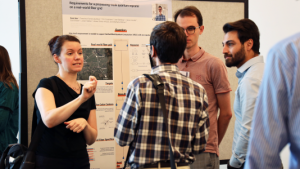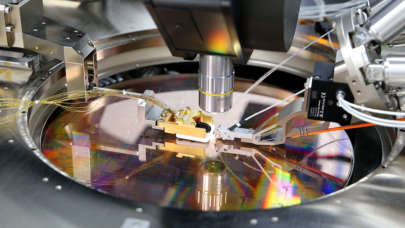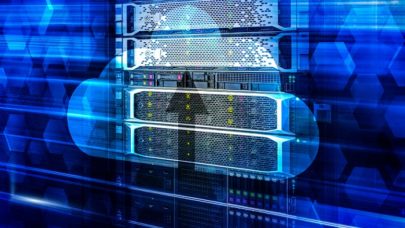Oct. 4, 2022 — In the coming decades, it is expected that quantum computers and new quantum sensors will be distributed around the globe. By harnessing the extremely small-scale, quantum features of nature, researchers are developing these devices — expected to be more powerful and precise than their traditional counterparts — for applications in numerous areas, including medicine, finance, energy and logistics.

To fully realize and exploit the combined capabilities of quantum technologies, they will need to be connected through a network that can transmit and receive quantum signals — in effect, a quantum version of the current internet.
The question currently before quantum technology experts is, “What paths do we need to take to build a quantum information network?”
In August, Q-NEXT and the Chicago Quantum Exchange locally co-organized the third Workshop on Quantum Repeaters and Networks (WQRN) at the University of Chicago to address the issue.
Q-NEXT is a U.S. Department of Energy (DOE) National Quantum Information Science Research Center led by DOE’s Argonne National Laboratory. The Chicago Quantum Exchange (CQE) is an intellectual hub for advancing the science and engineering of quantum information within the CQE community, across the Midwest, and around the globe.
The meeting was part of the WQRN series, started in 2015, dedicated to solving scientific, engineering and infrastructure problems in quantum communication and networking.
“The workshop strives to set up sessions about the big questions in quantum networks,” said Thaddeus Ladd, a principal scientist at HRL Laboratories, a co-design engineer within Q-NEXT and the lead for the workshop’s Local Organization Subcommittee. “We want to update the community of researchers developing theory, components and systems for quantum networks and repeaters and provide a forum — literally a workshop — for inspiring and establishing future directions in the field.”
The development of quantum information networks and repeaters — devices that help sustain quantum signals as they zip from point A to point B — is a priority for both Q-NEXT and CQE, as well as for scientists and engineers around the world. Roughly 100 researchers from 37 institutions in 13 states and eight foreign countries attended the workshop.
Unlike larger, broader conferences that include quantum networks as only part of the discussion, the WQRN series is laser-focused on the topic, delving deep into problems specific to the quantum transmission of information. The workshop is designed to engage both presenters and attendees equally in conversation that advances the state of research.
The previous WQRN meeting took place in 2017, and after five years and a pandemic that put research conferences on pause, August’s forum was a welcome opportunity for reconnection.
“It’s harder to keep up when you see just the alerts each week about what new papers are published. It’s much better when someone is actually presenting a talk,” said Tim Spiller, a professor of quantum technologies at the University of York and one of the workshop presenters. “For me, it was nice to note the real progress. It was a very useful update on what’s going on worldwide.”
The pressing issues facing today’s quantum information researchers were reflected in the workshop’s overlapping topics: current worldwide quantum communication efforts, theory and metrics, components of quantum repeaters and networks, and scaling the technology.
“Quantum networks are at an interesting place as a technology: They have significant worldwide interest and funding, and yet it remains unclear what critical application needs they are best suited to satisfy,” Ladd said.
And that’s the challenge: simultaneously grasping the technology’s potential, anticipating its applications, and developing it toward concrete uses — and doing it all in a way that satisfies a global community of users.
“The workshop had an element of strategy, discussions about how the research is done, not just the technical work that’s being pursued,” Spiller said.
It was a well-rounded meeting, bringing together quantum theory experts and quantum experimentalists, and more senior researchers with early-career scientists.
The weekend workshop was preceded by a half-day quantum-network tutorial taught by Keio University’s Rodney Van Meter. The tutorial was designed to bring traditional-information-network experts up to speed on the latest in quantum information R&D.
“I know of no other event like this with international reach in the specific field of quantum repeaters and networks,” Ladd said. “Good science cannot happen in a vacuum. Practitioners need to interact and get direct feedback from peers, in any field. That kind of interaction was active and lively throughout the event.”
The next WQRN will take place in 2024.
“A core mission of both Q-NEXT and CQE is to promote national and international research in quantum communication, and that means connecting on both accomplishments and the work that still needs to be done. The WQRN workshop was an opportunity to do exactly that,” said David Awschalom, director of both Q-NEXT and CQE, Argonne senior scientist, and Liew Family professor of molecular engineering and vice dean of research and infrastructure at the University of Chicago’s Pritzker School of Molecular Engineering. “It’s fair to say that nearly everyone who attended learned something that will influence their research direction. I expect that many of us will be able to attribute future research advances to our interactions at this valuable workshop.”
About Q-NEXT
Q-NEXT is a U.S. Department of Energy National Quantum Information Science Research Center led by Argonne National Laboratory. Q-NEXT brings together world-class researchers from national laboratories, universities and U.S. technology companies with the goal of developing the science and technology to control and distribute quantum information. Q-NEXT collaborators and institutions will create two national foundries for quantum materials and devices, develop networks of sensors and secure communications systems, establish simulation and network test beds, and train the next-generation quantum-ready workforce to ensure continued U.S. scientific and economic leadership in this rapidly advancing field.
About Argonne
Argonne National Laboratory seeks solutions to pressing national problems in science and technology. The nation’s first national laboratory, Argonne conducts leading-edge basic and applied scientific research in virtually every scientific discipline. Argonne researchers work closely with researchers from hundreds of companies, universities, and federal, state and municipal agencies to help them solve their specific problems, advance America’s scientific leadership and prepare the nation for a better future. With employees from more than 60 nations, Argonne is managed by UChicago Argonne, LLC for the U.S. Department of Energy’s Office of Science.
Source: Leah Hesla, Argonne



























































